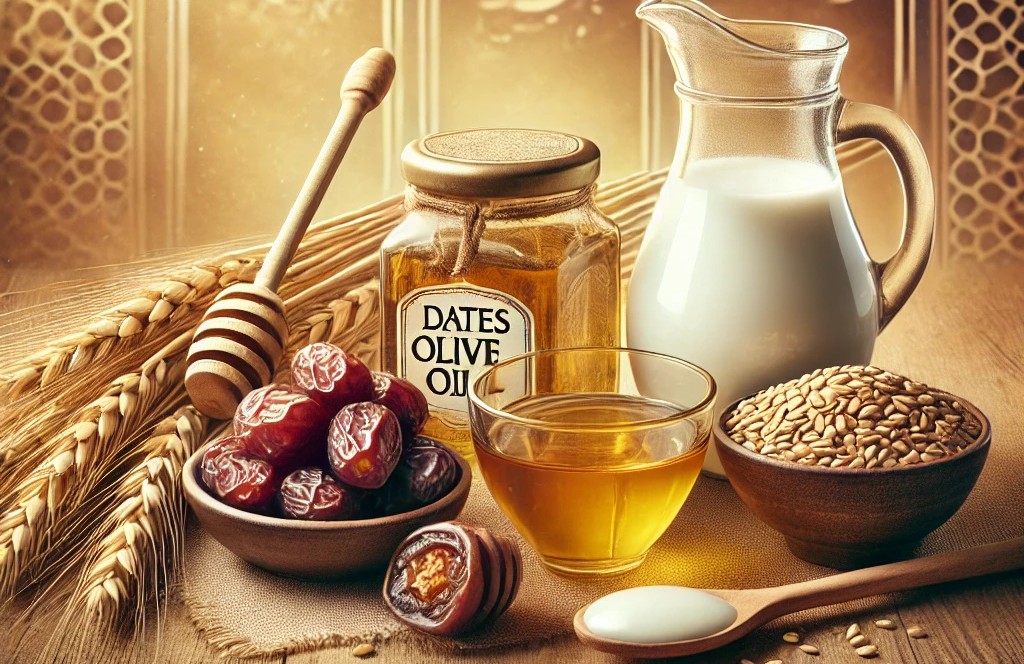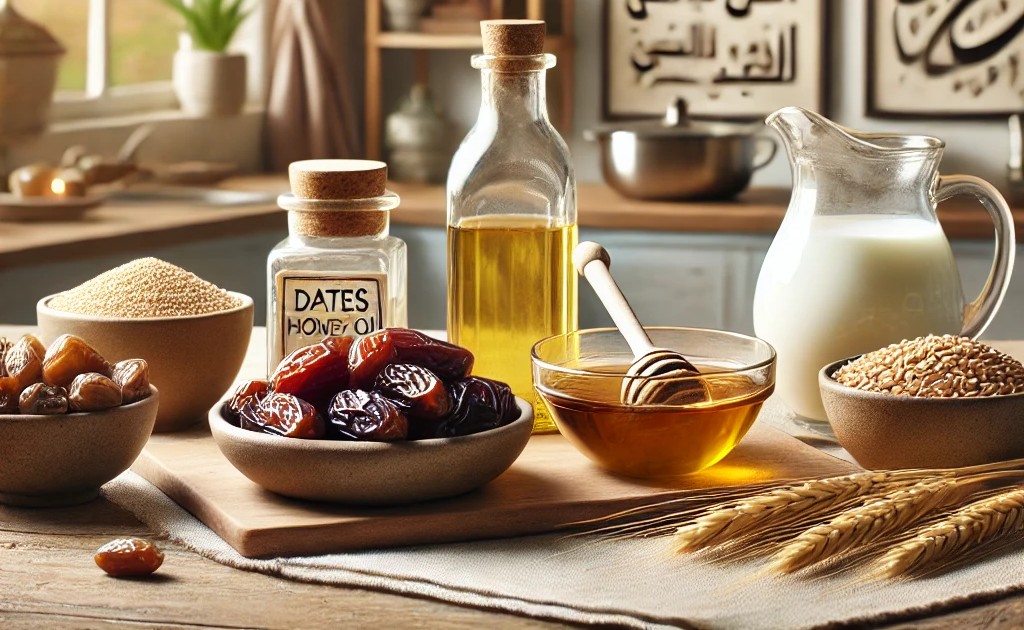Top 5 Sunnah Foods and How to Include Them in Your Diet

The Sunnah, the teachings and practices of Prophet Muhammad (peace be upon him), offers guidance in every aspect of life, including healthy eating. The Prophet (peace be upon him) encouraged a balanced diet, emphasizing natural and wholesome foods. This article explores five Sunnah foods, their health benefits, and practical ways to incorporate them into your daily diet.
1. Dates
Dates hold a special place in Islamic tradition. The Prophet (peace be upon him) often broke his fast with dates, as they are a quick source of energy and rich in nutrients like fiber, potassium, and natural sugars.
Benefits:
- Boosts energy levels quickly.
- Promotes healthy digestion.
- Contains antioxidants that support the immune system.
How to Include Dates in Your Diet:
- Break your fast with 2-3 dates and a glass of water.
- Add chopped dates to your morning oatmeal or yogurt.
- Use dates as a natural sweetener in smoothies or desserts.
For more about the benefits of dates, you can visit Healthline’s article on dates.

2. Honey
Honey is referred to in the Quran as a healing food. The Prophet (peace be upon him) often consumed honey for its therapeutic properties.
Benefits:
- A natural remedy for coughs and sore throats.
- Provides a quick source of energy.
- Has antibacterial and anti-inflammatory properties.
How to Include Honey in Your Diet:
- Stir a teaspoon of honey into warm water or herbal tea.
- Drizzle honey over toast, pancakes, or fresh fruit.
- Use honey as a natural alternative to sugar in baking.
Caution: Honey should not be given to children under one year of age.
Learn more about honey’s benefits at Mayo Clinic’s guide to natural remedies.
3. Olive Oil
The Prophet (peace be upon him) recommended using olive oil for eating and as a topical treatment. Olive oil is rich in healthy fats and antioxidants.
Benefits:
- Supports heart health by reducing bad cholesterol.
- Improves skin health when used externally.
- Contains anti-inflammatory properties.
How to Include Olive Oil in Your Diet:
- Use olive oil as a dressing for salads or drizzling over roasted vegetables.
- Dip whole-grain bread in olive oil mixed with herbs.
- Replace butter with olive oil when cooking or baking.
Read more about the benefits of olive oil at WebMD’s olive oil guide.

4. Barley
The Prophet (peace be upon him) recommended barley as a nutritious grain. It is often used to make Talbina, a porridge known for its soothing properties.
Benefits:
- High in fiber, promoting good digestion.
- Helps regulate blood sugar levels.
- Supports heart health.
How to Include Barley in Your Diet:
- Cook barley and use it as a base for soups or salads.
- Prepare Talbina by cooking barley flour with milk, honey, and water.
- Add cooked barley to stews or use it as a rice alternative.
5. Milk
Milk was frequently consumed by the Prophet (peace be upon him). It is a complete source of essential nutrients like calcium, protein, and vitamins.
Benefits:
- Strengthens bones and teeth.
- Supports muscle growth and repair.
- Provides a good source of hydration.
How to Include Milk in Your Diet:
- Drink a glass of milk with honey for added benefits.
- Use milk as a base for smoothies or shakes.
- Add milk to tea, coffee, or cereals.
For more about dairy nutrition, visit National Dairy Council’s website.
The Good and Bad Sides of Sunnah Foods
Good Sides:
- Sunnah foods are natural, wholesome, and packed with nutrients that support overall health.
- They align with modern scientific findings on healthy eating.
- Consuming these foods brings spiritual satisfaction by following the practices of the Prophet (peace be upon him).
Bad Sides:
- Overconsumption of even healthy foods can lead to imbalances. For example, too much honey or dates can contribute to weight gain due to their high sugar content.
- People with specific health conditions, such as diabetes, should moderate their intake of certain Sunnah foods and consult a doctor.
- Some Sunnah foods, like barley or milk, may not suit individuals with allergies or intolerances.
Final Thoughts
Including Sunnah foods in your diet is a beautiful way to follow the practices of the Prophet (peace be upon him) while enhancing your health. Start small by incorporating one or two of these foods into your meals and gradually build a diet inspired by the Sunnah. Always remember moderation is key, and seek guidance from healthcare professionals if you have dietary restrictions or health concerns.
If you’re looking for more inspiration, check out IslamicFinder’s resources on Sunnah practices.










